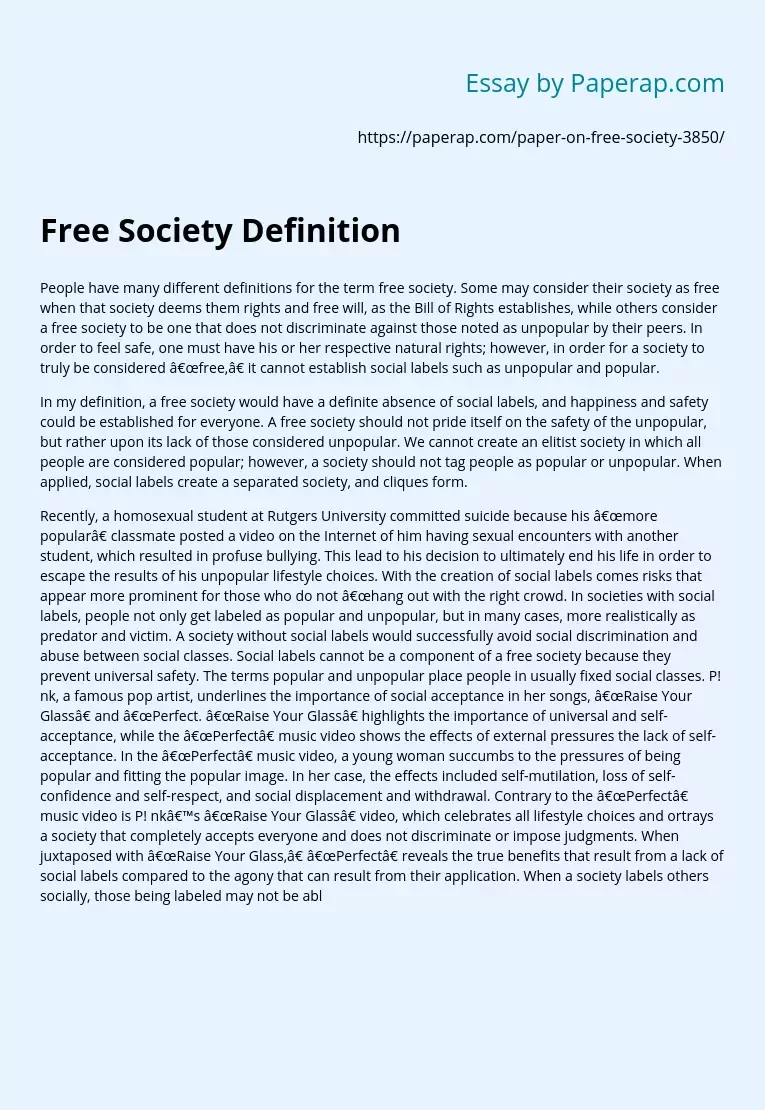Free Society Definition
People have many different definitions for the term free society. Some may consider their society as free when that society deems them rights and free will, as the Bill of Rights establishes, while others consider a free society to be one that does not discriminate against those noted as unpopular by their peers. In order to feel safe, one must have his or her respective natural rights; however, in order for a society to truly be considered “free,” it cannot establish social labels such as unpopular and popular.
In my definition, a free society would have a definite absence of social labels, and happiness and safety could be established for everyone. A free society should not pride itself on the safety of the unpopular, but rather upon its lack of those considered unpopular. We cannot create an elitist society in which all people are considered popular; however, a society should not tag people as popular or unpopular. When applied, social labels create a separated society, and cliques form.
Recently, a homosexual student at Rutgers University committed suicide because his “more popular” classmate posted a video on the Internet of him having sexual encounters with another student, which resulted in profuse bullying. This lead to his decision to ultimately end his life in order to escape the results of his unpopular lifestyle choices. With the creation of social labels comes risks that appear more prominent for those who do not “hang out with the right crowd. In societies with social labels, people not only get labeled as popular and unpopular, but in many cases, more realistically as predator and victim.
A society without social labels would successfully avoid social discrimination and abuse between social classes. Social labels cannot be a component of a free society because they prevent universal safety. The terms popular and unpopular place people in usually fixed social classes. P! nk, a famous pop artist, underlines the importance of social acceptance in her songs, “Raise Your Glass” and “Perfect. “Raise Your Glass” highlights the importance of universal and self-acceptance, while the “Perfect” music video shows the effects of external pressures the lack of self-acceptance. In the “Perfect” music video, a young woman succumbs to the pressures of being popular and fitting the popular image. In her case, the effects included self-mutilation, loss of self-confidence and self-respect, and social displacement and withdrawal. Contrary to the “Perfect” music video is P! nk’s “Raise Your Glass” video, which celebrates all lifestyle choices and ortrays a society that completely accepts everyone and does not discriminate or impose judgments. When juxtaposed with “Raise Your Glass,” “Perfect” reveals the true benefits that result from a lack of social labels compared to the agony that can result from their application. When a society labels others socially, those being labeled may not be able to fully accept themselves. P! nk shows the brutal effects of the pressures caused by social labels and that accepting everyone, regardless of social status, leads to ultimate happiness.
A free society cannot allow for the creation or use of social labels and placement in social classes. The implementation of social labels has imposed negative outcomes that have devastated not only individuals, but the families of those individuals as well. Universal safety can only be established through the ban of social labels, and therefore a ban of social discontent. A free society is defined by its lack of social labels and, therefore, universal safety.
Free Society Definition. (2019, Dec 05). Retrieved from https://paperap.com/paper-on-free-society-3850/

